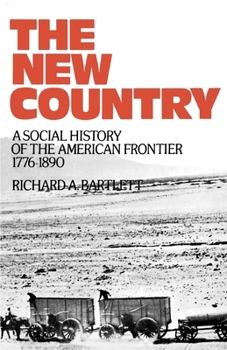The New Country: A Social History of the American Frontier 1776-1890
Select Format
Select Condition 
Book Overview
From borax mule trains to the canoe stop that was Chicago in the 1830s, this book vividly recreated the tale of the westward movement of pioneers into the heartland of North America. With nearly a century separating historian Richard Bartlett from the end of the movement, Bartlett's broad perspective stresses the continuity and inevitability of this greatest element of America's Golden Age. The book focuses on the settlement of the country, the racial...
Format:Paperback
Language:English
ISBN:0195020219
ISBN13:9780195020212
Release Date:February 1976
Publisher:Oxford University Press
Length:512 Pages
Weight:1.05 lbs.
Dimensions:1.2" x 5.7" x 8.4"
Customer Reviews
2 ratings
A Precursor of the "New Western History"
Published by Thriftbooks.com User , 18 years ago
When I was in graduate school in the latter 1970s the "new western history" was just emerging as the dominant school of thought about the history of the American frontier. Historians overturned Frederick Jackson Turner's "Frontier Thesis" with its exceptionalist expression of American character and its emphasis on British civilization, finding it both ill-equipped to explain the western experience and incomplete in its treatment of non-English peoples on the hinterlands of the United States. Instead of the positive metaphor for American uniqueness, many criticized the frontier experience as representative of some of the worst attributes of the United States. The "new western history" was dominated by what one wit called the "gang of four"--Patricia Nelson Limerick, Richard White, William Cronon, and Donald Wooster--whose work embodied many of the most interesting and unique elements of this new approach to western studies. I can remember Patty Limerick telling an audience at the Western History Association that the "gang of four" was more like a gang of 400, since she and her colleagues were simply part of a much larger reinterpretation of western history. She was right, and such works as this one by Richard Bartlett helped pave the way for a fundamental reinterpretation of western America. "The New Country" presents a synthesis of many of the themes of this "new western history." Bartlett offers "a poignant story of people elevating themselves to new affluence and dignity in a new country, in a new civilization of their own making" (p. vi). He rescues from obscurity the myriad peoples, races, and cultures that intermingled on the Trans-Mississippi west of the United States. In so doing, he emphasizes the stories of women and children, religious groups, African Americans, various ethnic groups, the Native Americans of the frontier, and others. At the same time Bartlett anticipates the broader reinterpretation of the American West that Limerick, White, Cronon, and Wooster spearheaded. "The New Country" is a stimulating discussion of the larger history of America's westward movement. It is a very fine analysis of the social history of what was a relatively unsocial part of the United States.
Brings the American Frontier to Life
Published by Thriftbooks.com User , 25 years ago
It is so hard to bring history together to give you a feel of what is going on at a certain point in time. Bartlett bites off a hudge chunk (1776 - 1890) and does a better job than I could imagine of making you feel what the people of that time were experiencing.






